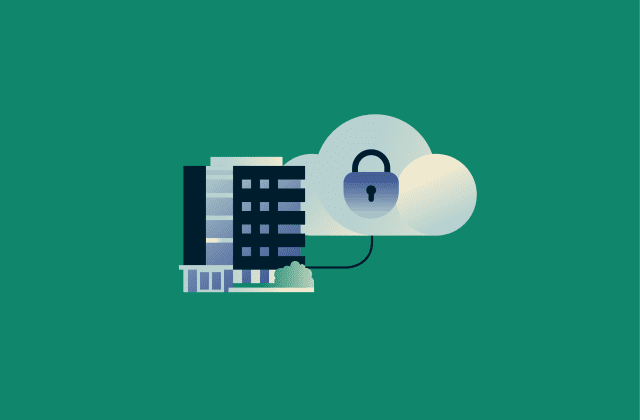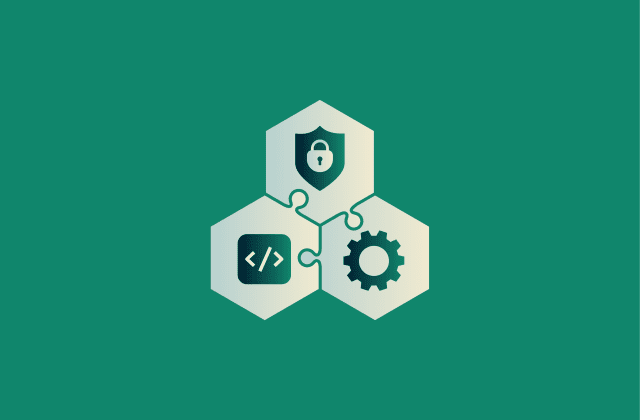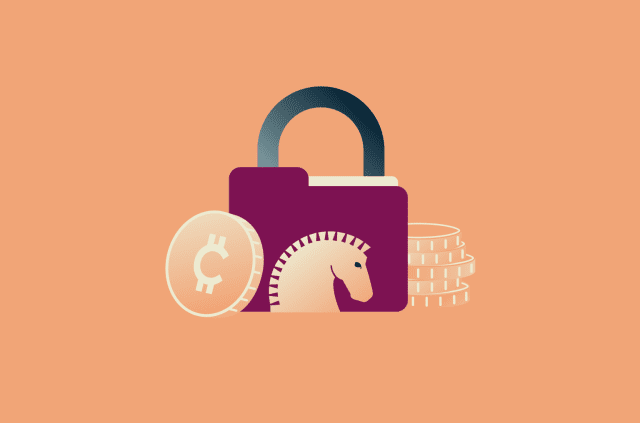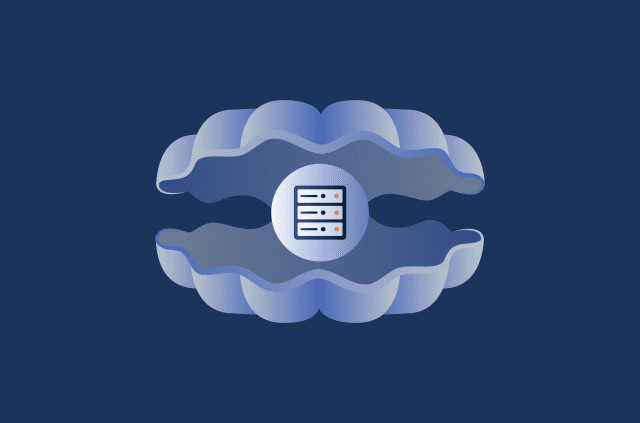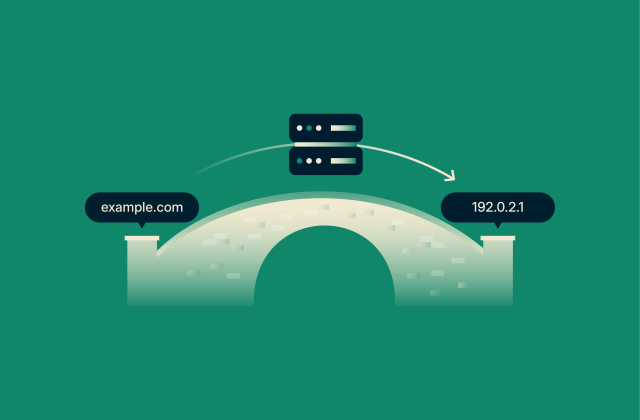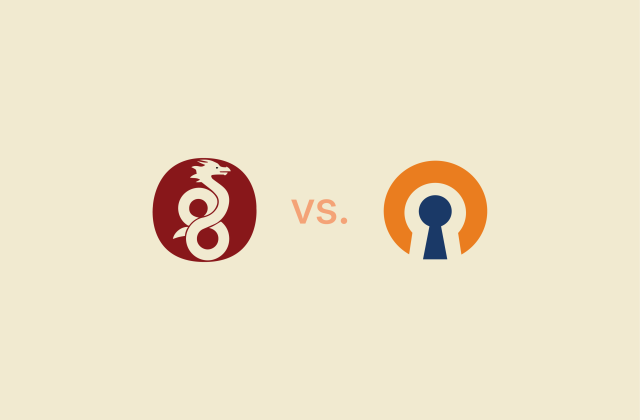What is criminal identity theft, and how does it occur?

Unlike most other forms of identity theft, criminal identity theft goes beyond direct financial losses and fraud. Instead, a victim’s life could be upended by criminal charges and court summons for offenses they didn’t commit, missed employment or admission opportunities, and even denial of immigration or citizenship applications.
So, what is criminal identity theft, and how does it happen?
In this guide, we’ll explore the basics of criminal identity theft to help you understand it, how to stay safe against it, and what to do if you’re ever a victim.
Please note: This information is for general educational purposes and not financial or legal advice.
Criminal identity theft explained
Criminal identity theft occurs when a criminal impersonates another person (using identity information such as a driver’s license) when stopped by law enforcement. This can lead to this person being falsely arrested for a crime they didn’t commit, a citation, or any other legal repercussion later on, as the initial offense is recorded against their name.
This is different from other types of identity theft, such as financial identity theft, in the way that criminals aren’t primarily looking to make money with the victim’s stolen personally identifying information (PII). Instead, they want to pin their crimes on someone else, making criminal identity theft even more dangerous.
How does criminal identity theft happen?
Identity thieves may access your PII in multiple ways, including:
Stolen or fabricated identity documents
Criminal identity thieves may steal your wallet, since they know that it’ll likely contain some PII (from your driver’s license and other forms of ID). Alternatively, criminal identity thieves may simply copy this important information when you leave your IDs unattended and use it to fabricate a new identity card.
Phishing and related attacks
Cybercriminals sometimes pose as legitimate personnel (such as tech support staff, government officials, brands, etc.) to send you malicious links. Clicking the link could download malware (such as keyloggers) that harvests your PII, or lead you to a page that tricks you into entering the information yourself.
Then, these cybercriminals can either use the details for criminal identity theft themselves or sell your details to other criminals on the dark web. While phishing attacks typically start over email, you can also be targeted via SMS (smishing) or calls (vishing).
Other social engineering attacks
Phishing, vishing, and smishing are all types of social engineering attacks, but they’re not the only ones targeting your PII:
- Pretexting: A threat actor presents you with a fake situation (such as your device being infected with malware) and proposes to solve it. In the process, they may get access to your devices or persuade you to divulge sensitive personal information.
- Fake giveaways: Scammers may offer you too-good-to-be-true purchase offers (such as a brand new computer for just $150), a giveaway contest prize, or something similar. But to get the fake prize, you’ll be tricked into entering some sensitive personal information.
- Scareware: Scareware is software that uses fear to manipulate people into sharing confidential information or downloading malware. Scareware tactics can include a fake law enforcement notice stating that you’ve been identified in a crime. The scammer may then ask you to fill out an online form with PII for some bogus reason, such as to clear your name.
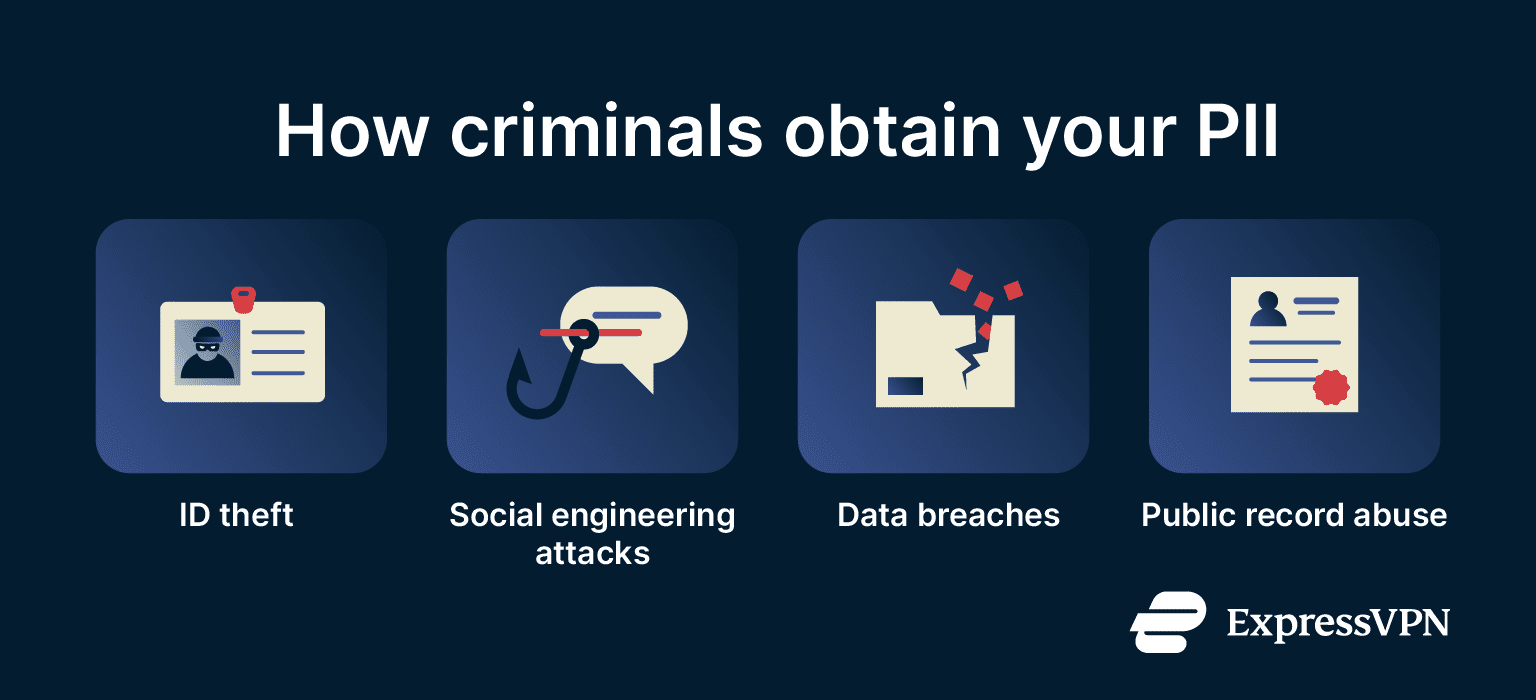
Data breaches
Threat actors often target government, healthcare, finance, technology, and other companies to steal sensitive PII. Below are some notable examples.
- Government breaches: Cybercriminals breached the Housing Authority of the City of Los Angeles in 2024. The responsible cybercrime group claimed to have stolen PII, executive and employee personal data, and customer information.
- Tech companies: In 2023, cybercriminals breached a file transfer software (MOVEit) and copied some PII in transit, including Social Security numbers (SSNs), names, dates of birth, health insurance information, tax identification numbers, and mailing addresses.
- Finance: In February 2024, debt collection agency Financial Business and Consumer Solutions was breached, granting threat actors access to sensitive PII (names, SSNs, driver’s license numbers, dates of birth, medical information, etc.) for over 4.25 million people.
- Healthcare: In March 2025, cybercriminals breached Connecticut’s largest healthcare network, Yale New Haven Health, and obtained copies of patient data, including names, dates of birth, SSNs, email addresses, and addresses.
Public record abuse
The government maintains public records, which, by definition, are not considered confidential and can be obtained for free or for an administrative fee. Cybercriminals may exploit this fact to gain more PII on (or insights into) their victims.
Affected public records include, but aren’t limited to:
- Birth and death certificates
- Marriage licenses and certificates
- Criminal records
Signs you may be a victim of criminal identity theft
You may have your identity stolen and used in a crime without detection for weeks, months, or even years before running into these red flags:
- You receive a court summons or arrest warrant: This could happen when someone has committed a crime using your identity, causing law enforcement to put out a warrant for your arrest or summon you to court.
- Job applications or loans denied due to criminal history: If you failed a background check for job applications or loans due to a criminal history you don’t recognize, then a criminal might have stolen your identity.
- Criminal records (including those in unfamiliar jurisdictions): A criminal using your identity may get traffic tickets or be charged for a crime in a jurisdiction you’ve never even been to.
- Unfamiliar public record entries: Your public record now shows entries of fines, charges, and maybe even sentences that you never received.
- Wrongful sex offender registry placement: This is often an indicator that an identity thief has committed sex-related offenses using your identity.
- Strange law enforcement stops: A routine traffic stop, for instance, may escalate into full detention if the officer believes you committed a crime or have active warrants racked up.
- Government-related penalties: You could face deportation threats, denial of citizenship, or even passport revocation if authorities mistakenly believe you committed a crime that was actually carried out by an identity thief.
You should also look out for other signs of general identity theft, as this may sometimes be a precursor to criminal identity theft.
What to do if you're a victim of criminal identity theft
Getting to know that your identity is being used for criminal purposes can be frustrating, isolating, and unsettling. Here are some strategies to start regaining your identity and clearing your name.
File an identity theft report
The Federal Trade Commission (FTC) has a dedicated page where you can file an identity theft report, which may come in handy when:
- Filing a police report (more on that below).
- Disputing legal charges.
- Disputing fraudulent credit card charges.
- Clearing your name and record.
The FTC will also create a personalized recovery plan to help you regain your identity after filing this report.
File a police report and clear your record
File a police report (and request a copy) in your jurisdiction to have official documentation of the criminal identity theft. In some jurisdictions, you may be able to ask the police for a clearance letter stating that you are not responsible for crimes committed by the identity thief.
Together, these may help you with some legal proceedings and disputes and to fully clear your name anywhere you’ve been wrongfully accused due to identity theft.
Contact affected agencies and employers
Depending on the extent of the damage already done, you’ll need to contact some agencies and entities. Some of these include, but aren’t limited to:
- Your employer: This protects you against the fallout from criminal background check errors, if they check.
- State attorney general: You can ask your state attorney general or a qualified legal professional about options for correcting or expunging records created due to identity theft.
- Police stations: You can discuss with your local police station contacting stations in other jurisdictions where you have a criminal record caused by the identity thief.
- Department of Motor Vehicles (DMV): Has your license accrued points or been revoked or suspended due to criminal identity theft? Contact and report to the DMV.
- Credit bureau: Get your credit reports from the three credit bureaus and review all of your transactions. You should also consider placing a credit freeze and fraud alert on your accounts, preventing other forms of identity theft damage.
- Companies and institutions: If your credit reports show transactions and charges that you didn’t make, contact the affected organizations, including a copy of your police report and FTC report, to dispute these transactions.
- The Social Security Administration (SSA): If you suspect that the identity thief may also have your SSN, contact the SSA to let them know.
Better safe than sorry: How to prevent criminal identity theft
Fully protecting your sensitive information from bad actors at all times is impossible, but there are steps you can take to minimize the risk. Since criminal identity theft requires your personally identifying details, it’s best to never carry all of your IDs at the same time, leave your IDs visible in public, or share sensitive personal information with strangers (or unverified people, even businesses) on the internet or in person.
Furthermore, you can use credit monitoring and identity protection services (like ExpressVPN’s Identity Defender) to check if your personal information has leaked on the dark web or is being traded by data brokers. That way, you can quickly report to the right authorities, request data deletion, and get appropriate advice to reduce the chances of criminal identity theft. Please note Identity Defender is available to ExpressVPN U.S. users.
Additionally, many of the general identity theft prevention tips also apply to criminal identity theft, so check out our identity theft prevention guide for more ways to stay safe.
FAQ: Common questions about criminal identity theft
What is criminal identity theft, and how does it occur?
Criminal identity theft occurs when an identity thief impersonates someone else, using personal information such as their Social Security number (SSN) or driver’s license, when committing a crime. This often leads to the victim being left to deal with the fallout of the criminal’s actions.
How many years in jail do you get for identity theft?
According to the U.S. Department of Justice, identity theft can carry a maximum sentence of up to 15 years in prison, with higher penalties possible if other crimes are involved.
Can you go to jail for something someone else did using your identity?
It’s possible to be detained or even jailed temporarily if law enforcement mistakenly believes you committed a crime due to identity theft. That’s why you should protect yourself against criminal identity theft and make moves to quickly clear your name if it happens.
How do I clear my record if I’m falsely accused?
You may be able to clear your record by filing reports with local law enforcement and seeking advice from a legal professional about your rights and options.
Take the first step to protect yourself online. Try ExpressVPN risk-free.
Get ExpressVPN



